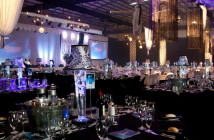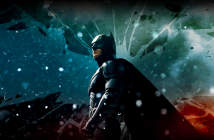
Editor’s Notes: Best of Enemies opens in Toronto today July 31st at TIFF Lightbox. For more on the film read Best of Enemies: A Terrific Look at the 1968 Buckley-Vidal Debates by Stacia Kissick Jones.
Imagine millions of people tuning into a televised political debates featuring men with high IQs. That actually happened in 1968 during the presidential elections. ABC News featured ten debates between liberal Gore Vidal and conservative William F. Buckley Jr. Through scholarly verbal sparring Vidal and Buckley threw up fireworks that spoke more about their volatile relationship than about the politics of the time itself.
I had the chance this spring over Hot Docs to speak with Morgan Neville (my first Oscar winner interview – Twenty Feet From Stardom), co-director of Best Of Enemies. It’s a documentary featuring the very heated debates and the conditions surrounding them.
The film is premiering in Toronto at the TIFF Lightbox on July 31st.
Jacqueline: I’m head over heels for Vidal and Buckley Jr. after watching this film. How was the idea for a film initiated?

Morgan Neville: I started in political journalism and I love politics. But I kind of made my career making movies about culture, music and art. I was quite familiar with Gore. I didn’t know the debates well.
The whole reason this came up was that Robert Gordon, my co-director/friend got a bootleg copy of the debates. Another friend of his who’s a professor, he’s a consulting producer on the film, showed them at his university. The reaction was huge. People just loved these raw debates. Robert said, “There’s something really interesting here.”
I watched them and I was totally transfixed as well.
It was bringing up all these things in my mind that interested me: public intellectuals like that, the kind of ad hominem nature of their attacks, and how it feels kind of Fox News-y. We didn’t initially think there was a documentary there. But we thought we’d shoot a few interviews and test the waters. So we set up a few people for interviews at the beginning.
There was Christopher Hitchens, Frank Rich, James Walcott, and Dick Cavett. All of them said yes immediately. So I said, “Ok that was interesting.”
Then we interviewed them. I think after the first or second interview we realized there was a huge story here. Everything that we had instinctively felt was true about these debates and what they meant was being articulated by these people. The idea how difficult these debates were in the media at that point in history. Ultimately the film to me isn’t about politics. It’s about the culture of politics. It’s a film about media, how intellectuals understand media, and how media doesn’t understand intellectualism. That’s stuff I’m totally fascinated by.
It was kind of a labor of love. We made it over five years. Christopher Hitchens has passed away. We interviewed him a week before he was diagnosed with cancer. I think May 2010. That was our first shoot. I think it was five years ago this month.
Jacqueline: Did any of them go on tangents?
Morgan Neville: That always happens. A lot of them had personal relationships with them. Hitchens was talking about being on the firing line himself. He had this vituperative exchange with Buckley once and at the end Buckley asked him, “Oh would you like to go out for drink?”
Jacqueline: But that’s the way it should be nowadays…
Morgan Neville: Exactly. Buckley was very much that way. There’s a story that isn’t in the film. When they first met on the David Susskind Show in 1964 they had a real punch up on air and afterwards Buckley said to Gore, “Do you want to go out and have a drink?”
And Gore said, “No,” in a way that was not polite.
So there was something about their relationship that was not business as usual for battling intellectuals of different stripes. There was something deep about their animosity and it’s fascinating. To me, because they were so similarly matched they thought the other could identify their insecurities in a way that made them feel vulnerable.
Jacqueline: I found copies on Youtube of parts of the debate, but they’re pretty old and poor quality. How hard was it to clean up that old footage?
Morgan Neville: It wasn’t hard. I mean, we did spent time cleaning it up. There are probably two and half hours of raw debates and they’re not all online, just some. The cleaning up wasn’t so hard.
Part of the fun of doing a project like this is the paper chase and the digging through archives. Somebody would say, “Oh wow, look at this!” and find this little something awesome. And not just from the debates, but all the other stuff too. We found so many great little nuggets.
There was the Playboy After Dark (There’s cool footage of Vidal shooting the breeze with Hugh Hefner in the film), there were so many of those. We spent years gathering footage and gathering material. We ended up going to ABC and the brought out cart after cart of 16mm film and watched the old films. We found so much good stuff. A film like this is all about interview search.
Jacqueline: What would like people to take away from Best of Enemies?
Morgan Neville: That we should ask more of our media. That media has great potential for us to engage. Now I feel like media is the gasoline on the fire of our political divisiveness when it should be the salve.
Jacqueline: It’s frustrating when you think about it…
Morgan Neville: I didn’t realize just how unprecedented that kind of angry debate was on television at the time because we see it everywhere now. You know, people shouting at each other on television.
In the mid-1960s you didn’t see that. People were very civil. We talk about when civil discourse became uncivil. How did that happen? Because we have so much uncivil discourse which at that point isn’t discourse at all. It becomes people arguing or fighting.
What interesting about these debates to me is that they knew better. They were people who were pretty articulate and substantive on television or elsewhere. However, when it came to each other their hatred got the better of their intelligence. They couldn’t help themselves, but get into it with each other even though it didn’t reflect well on them.
The lesson the media took from them was ultimately having intellectuals throwing off sparks was great, but you only need the sparks, you don’t need the intellectuals. Anybody can argue and that’s all people want to do now.
I love that line Dick Walcott, the former head of NBC news, in the film says, “Arguments are sugar and the rest of us are flies.”
Jacqueline: Another quote that I loved from the film, something like, I’m paraphrasing heavily here, “Media wasn’t there to posit these opinions, they were there to present them…”
Morgan Neville: I think it was that the media weren’t dividers of opinion, but uniters of opinion. Now we have channels that are all about dividing opinions because that’s their business.
That’s something we wanted to touch upon was what is the ultimate effect of that. People don’t even have to hear opinions they don’t agree with anymore. They just hear the bashing. We end up in these communities of concern where all we listen to is our own opinions. You can go on Google and Google knows a fair amount about you and starts giving you searches based on what are the things you want to hear. You end up getting opinions, facts, and websites that are tailored to you. It’s already getting editorialized for you.
It’s a slippery slope if we can’t agree on truth. I think that’s the part, for better or worse, that having a centralized media has its downside. One thing it did do was that everybody was watching the same thing.
Jacqueline: Yeah because it was ten million viewers that were watching that night…
Morgan Neville: That was a lot of people. * laughs *
Jacqueline: How many people nowadays would actually watch a debate like that? I mean, even if they tried to bring it back.
Morgan Neville: “Yeah, no…”
Jacqueline: * laughs *
Morgan Neville: A thousand people?



